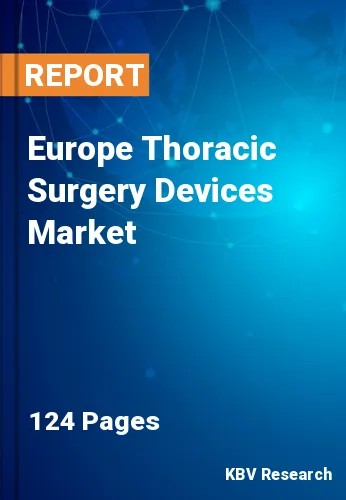The Europe Thoracic Surgery Devices Market would witness market growth of 5.9% CAGR during the forecast period (2023-2030).
The development of bioprinting technology allows for the creation of 3D-printed tissues and organs. In thoracic surgery, this innovation offers the potential for customized implants and prosthetics that closely mimic natural tissues. Non-invasive lung ablation techniques are being explored for the treatment of lung tumors. These procedures use energy-based devices to destroy tumors while minimizing damage to surrounding healthy tissue. Nano-robots are being researched for precise drug delivery to treat thoracic conditions. These miniature devices can navigate the circulatory system and deliver medication directly to affected areas. Emerging gene-editing technologies, such as CRISPR-Cas9, offer potential solutions for genetic thoracic conditions. Researchers are investigating the possibility of modifying or correcting genes responsible for diseases like cystic fibrosis.
The market is expected to increase due to several causes, including the rising incidence of lung cancer, chronic obstructive pulmonary disease (COPD), heart disorders, ongoing improvements in surgical methods and equipment, minimally invasive options, and population aging. A significant market development driver is the growing elderly population. The elderly are more susceptible to thoracic conditions such as lung cancer, esophageal disorders, and cardiovascular diseases. The increased prevalence of these diseases in the elderly drives increased demand for thoracic surgeries and the devices required to perform them effectively.
According to a report on the French aging policy published by the UN, as in other European countries, France faces a continuous and significant increase in older people: in 2012, there were 15 million people aged more than 60 years old in France. This number will reach 24 million in 2060. Lung cancer is a significant concern in France, predominantly affecting older individuals. France has a well-established government-funded healthcare system that provides coverage for surgical treatments for thoracic diseases. Due to these aspects, the market will increase across Europe in the upcoming years.
The Germany market dominated the Europe Thoracic Surgery Devices Market, by Country in 2022, and would continue to be a dominant market till 2030; thereby, achieving a market value of $61.7 Million by 2030. The UK market is experiencing a CAGR of 4.9% during (2023 - 2030). Additionally, The France market would exhibit a CAGR of 6.8% during (2023 - 2030).
Based on Surgery Type, the market is segmented into Lobectomy, Wedge Resection, Pneumonectomy, and Others. Based on Product, the market is segmented into Forceps, Graspers, Clamps & Staplers, Scissors, Spreaders, Needle Holders, and Others. Based on End-use, the market is segmented into Hospitals, Ambulatory Surgical Centers, and Others. Based on countries, the market is segmented into Germany, UK, France, Russia, Spain, Italy, and Rest of Europe.
Free Valuable Insights: The Global Thoracic Surgery Devices Market will Hit $998.1 Million by 2030, at a CAGR of 6.1%
The market research report covers the analysis of key stake holders of the market. Key companies profiled in the report include Medtronic PLC, Cardiotrack, Intuitive Surgical, Inc., Richard Wolf GmbH, Grena Ltd., Dextera Surgical Inc. (Aesculap Inc.), Teleflex, Inc., Medela AG, LivaNova PLC, and Sklar Corporation.
By Surgery Type
By Product
By End-use
By Country
Our team of dedicated experts can provide you with attractive expansion opportunities for your business.

